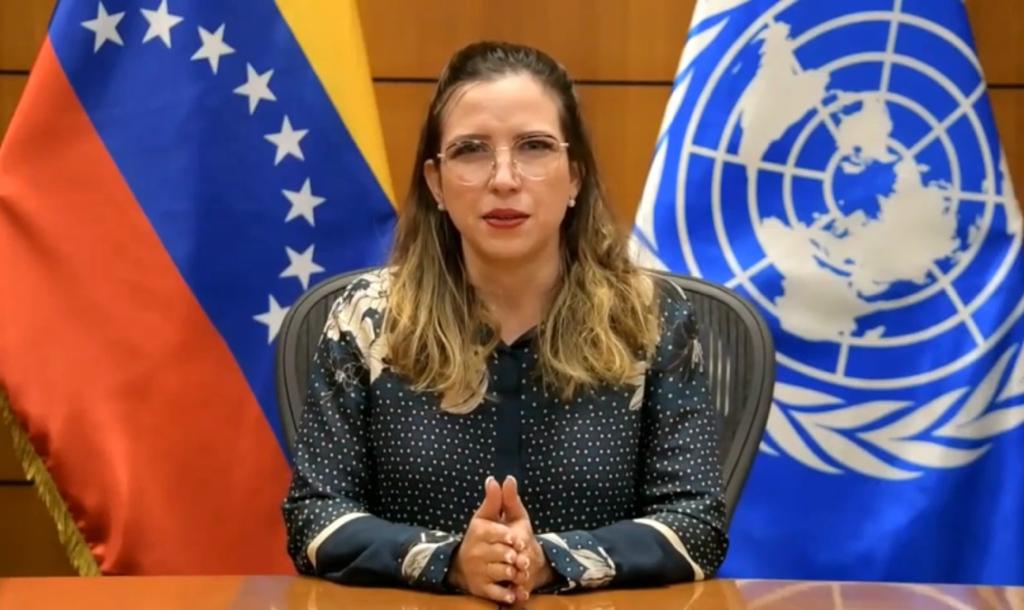Venezuela’s Vice-minister for Multilateral Affairs, Daniela Rodríguez, participated on Monday in the virtual High-Level Segment of the Conference on Disarmament, held in Geneva, Switzerland, ratifying the commitment of the Bolivarian Republic of Venezuela to the international regime of non-proliferation and arms control.
In her statement, the Venezuelan diplomat stressed the importance of the Conference on Disarmament “to offer the world a privileged platform for negotiation and confidence-building and as a guarantee for peace and security” in the face of the multifaceted threats to which countries are exposed, considering “that nuclear disarmament is the highest priority of the international agenda.”
In this regard, Vice-minister Rodríguez urged to “comprehensively review the compliance with the Treaty on the Non-Proliferation of Nuclear Weapons to guarantee a substantial progress and achieve the objective of building a world free of nuclear weapons through their total, irreversible, verifiable and non-discriminatory elimination.”
On January, 2021, the Treaty on the Prohibition of Nuclear Weapons (TPNW) entered into force to expressly and comprehensively prohibit nuclear weapons. The Treaty tackles the humanitarian impact associated with the testing and use of nuclear weapons.
“Venezuela considers this is one of the most important facts of the international regime of disarmament and non-proliferation in the last 50 years, leading us to take a further step to meet the aspiration of peace-loving people towards the total elimination of these weapons,” stressed Rodríguez.
Likewise, Venezuela congratulated the Republic of Cuba for ratifying the Comprehensive Nuclear-Test-Ban Treaty, and the United States of America and the Russian Federation for extending the New Strategic Arms Reduction Treaty, or New START, until February, 2026.
“Venezuela welcomes the Conference on the Establishment of a Middle East Zone Free of Nuclear Weapons and Other Weapons of Mass Destruction, held in November 2019 at the United Nations Headquarters in New York, and stresses the importance of moving forward towards the application of the Resolution on the Middle East adopted at the Conference of the Parties to the Treaty on the Non-Proliferation of Nuclear Weapons,” added the Venezuelan vice-minister for Multilateral Affairs.
Impact of Conditions on Nuclear Disarmament
In her statement, the Venezuelan diplomat expressed the Bolivarian Government’s concern about “the impact of some states’ growing tendency to impose conditions on nuclear disarmament by claiming geopolitical considerations and subjective, non-consensual categories regarding international security,” and rejected “the repositioning of nuclear weapons as the central axis of new national security doctrines like the Nuclear Posture Review of the United States of America in February 2018.”
“Venezuela rejects the militaristic approach to outer space, and thinks it is fundamental to move forward towards the establishment of a new legally binding international instrument allowing to prevent outer space to become a new war scenario,” she said.
Finally, Rodríguez called on the member states to dialogue and concertation so that the Conference on Disarmament can resume its substantive work as the only multilateral negotiating body on disarmament.
“We are all called to contribute so that this body can resume its mission and avoid its politization,” stressed the Venezuelan diplomat.
The Conference was first established as the Committee on Disarmament and was renamed the Conference on Disarmament in February 7, 1984, after succeeding other United Nations disarmament-related bodies in 1978 at the First Special Session of the General Assembly on Disarmament, which decided its establishment as the main international, deliberative and the only multilateral negotiating body on this matter.



